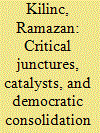|
|
|
Sort Order |
|
|
|
Items / Page
|
|
|
|
|
|
|
| Srl | Item |
| 1 |
ID:
133225


|
|
|
|
|
| Publication |
2014.
|
| Summary/Abstract |
IN FEBRUARY 1997, THE TURKISH MILITARY INTERVENED in politics to protect secularism from the "rising Islamist threat." This intervention resulted in the toppling of the coalition government led by the Islamic-oriented Welfare Party (RP, Refah Partisi). Many civil and political restrictions followed this intervention, including the closure of the RP by the Constitutional Court. Two years later, the Chief of Staff, Hüseyin K?vr?ko?lu, stated that "the 28 February process," by which he meant the military-sanctioned political configuration,would continue for one thousand years if necessary.1 However, by 2012, only 15 years after the intervention, the military's ability to shape politics has diminished notably. By any measure, the civilian oversight of the military is now at its highest level since the first military coup in modern Turkey in 1960.2 The Islamic-oriented Justice and Development Party (AK Party, Adalet ve Kalk?nma Partisi)3 stayed in power for more than a decade. Furthermore, Turkey implemented several democratic reforms that reversed the authoritarian movement of the period immediately after the 1997 military intervention. Additionally, the Parliament passed laws that liberalized the Press Law, Turkish Penal Code, the state policies toward religious minorities, rights for Kurdish minorities, and human rights regulations.4 Since Turkey transited to multi-party politics in 1945, it has experienced four military interventions (1960, 1971, 1980, and 1997); each time, the military built a political system that maintained its influence even after the transfer of power to civilian government. Given Turkey's long history with military tutelage, including its orchestrated effort to redesign Turkish politics in the late 1990s, these liberalizing reforms have been revolutionary for democratic consolidation. Therefore, it can be asked: How did Turkey recover and consolidate its democracy within such a short period?
|
|
|
|
|
|
|
|
|
|
|
|
|
|
|
|
|
|
|
|
|